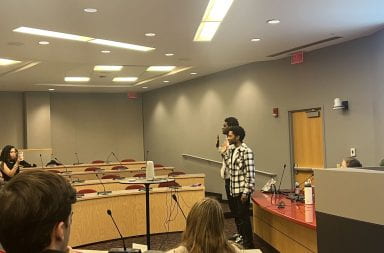The definition of what constitutes a conflict of interest for student employees, faculty and staff working at the university has been expanded as a result of a revised policy from Ohio State’s Office of Human Resources.
The “significantly revised” policy on nepotism and conflict of interest became effective July 1, according to an email to faculty from OSU vice president and chief human resources officer Kathleen McCutcheon.
Human Resources announced the updated policy on its website Oct. 3, and McCutheon sent out an email to university employees Oct. 10.
Nepotism is defined as “favoritism applied … through authority or influence by someone in a position of power, toward family members or others for whom the employee is legally responsible. Favoritism is shown by giving preferential treatment in any employment action to family members and others,” according to the Office of Human Resources’ “Nepotism Policy 1.25.”
The nepotism policy was changed to expand the definition of family member to include first cousin, aunt, uncle, niece, nephew and corresponding step-relatives. The former policy only named “immediate family members” as family, according to the email sent to faculty.
All current faculty, staff, graduate associates and student employees are required to disclose their position and develop an “alternative arrangement agreement” if they are in a situation of nepotism by Dec. 7, according to McCutheon’s email.
The updated policy is intended to create an atmosphere of more workplace disclosure.
“This is to ensure that conflicts of interest/nepotism are properly addressed and that there is no appearance of impropriety in our hiring, evaluation, promotion or salary decisions,” said Olga Esquivel-Gonzalez, a law and compliance manager for the Office of Academic Affairs, in an email.
The new policy also addresses work university employees complete outside the university and states that “staff must disclose if they are currently engaged in external work that has not been approved in writing by their supervisor or unit,” according to the email.
The revision was done to keep the policy up to date, Esquivel-Gonzalez said.
“In accordance with the university policy process, we solicited feedback on all policies to ensure that they are up to date and clearer with regard to duty to disclose, accountability and responsibilities,” Esquivel-Gonzalez said.
Faculty and staff were consulted and given the chance to offer feedback, and they have also submitted questions about the process and forms Human Resources released, Esquivel-Gonzalez said.
Some students feel that the nepotism policy is important to the way the university operates.
“I think generally nepotism policies are helpful,” said Deirdre Rosenfeld, a graduate student in higher education and student affairs. “I think nepotism policies protect people who are in more vulnerable jobs and I think that would make OSU a strong employer … Hopefully OSU’s nepotism would make sure that people aren’t punished for being in a relationship and working in similar fields.”
Other students said that even though relationships are semi-private information, it’s important for an employer to be aware of them.
“I think that’s kind of private, but also I think it does affect the decisions that they will make in some way,” said Haley Willard, a second-year in biology. “But I don’t know, I just feel like they’re acting on our privacy. I don’t think that’s really any of their business, but I mean, if there’s been really serious situations, I would understand. But I haven’t heard any problems with it.”
Some students said the university is intruding on faculty privacy to request disclosure of other places they work.
“I have to admit, isn’t there something a little bit creepy about saying, ‘Hey you owe us information about your private life’?” Rosenfeld said. “I guess I would want my boss to confront me about the quality of my work or whether or not I’m meeting expectations instead of limiting my ability to contract outside.”
Halie Williams contributed to this article.


